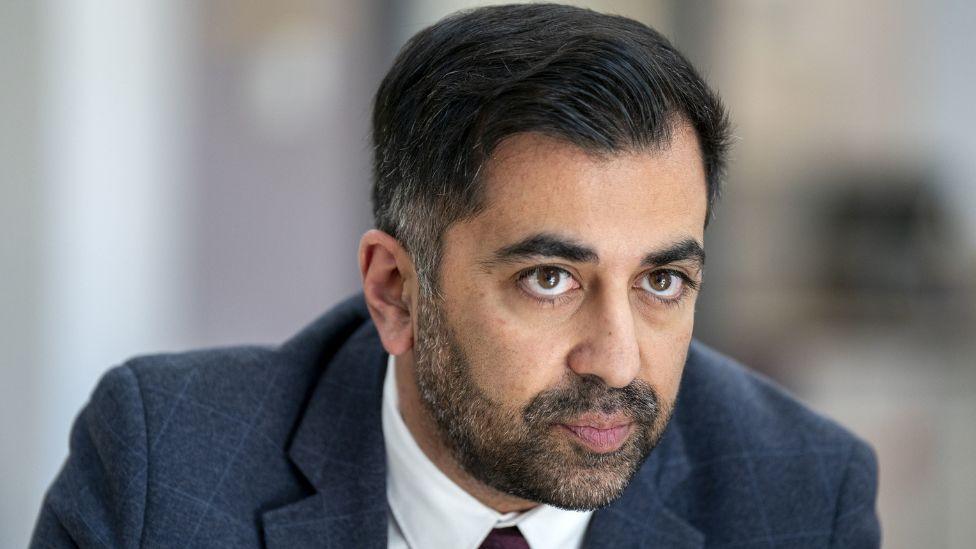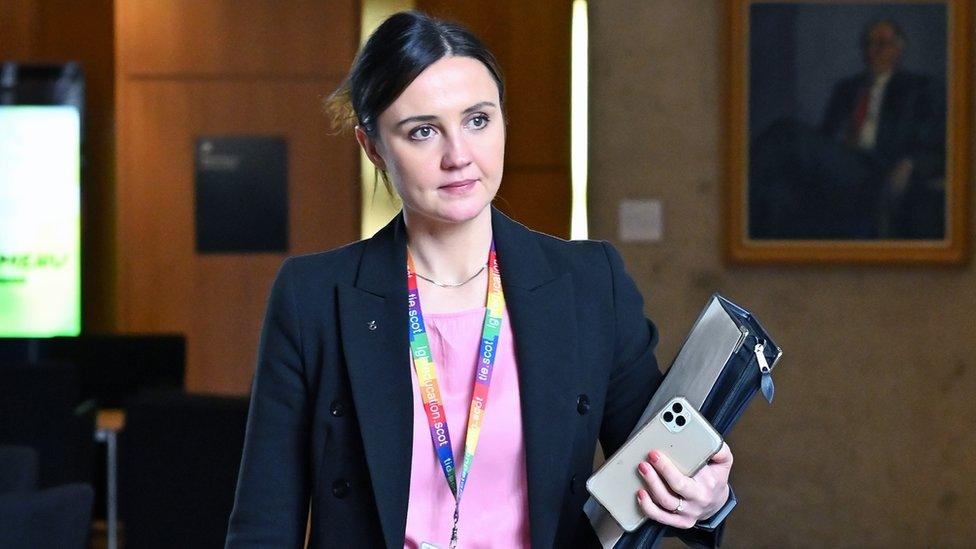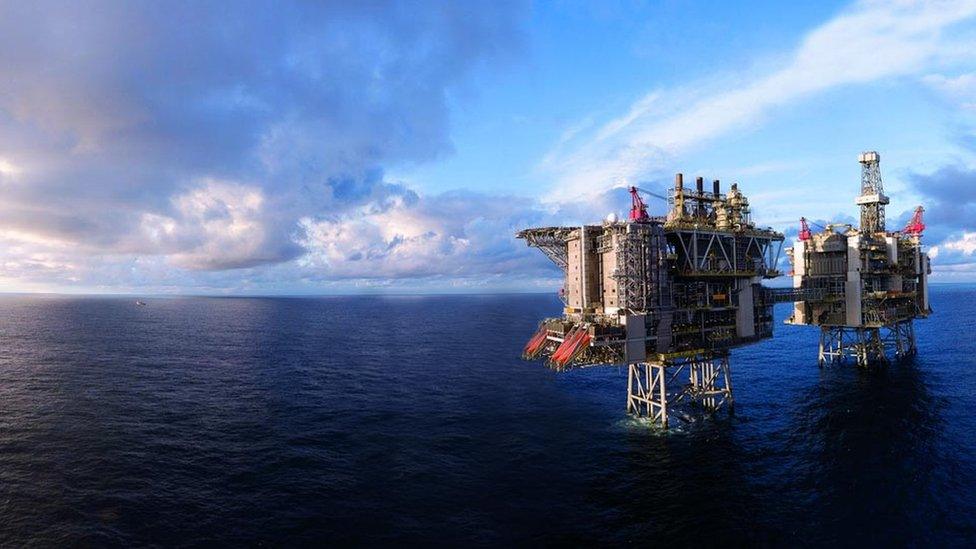Humza Yousaf: Scotland can lead world in climate crisis
- Published

Humza Yousaf has travelled to New York for a climate conference
Scotland will transition from Europe's oil and gas capital to its net-zero capital as it provides "moral leadership" on the climate crisis, Humza Yousaf has claimed.
The first minister said his government was "putting money where our mouth is" during a speech at a New York Climate Week event.
He announced funding for countries worst affected by climate change.
Mr Yousaf was the keynote speaker at an event on "financing climate justice".
He warned countries in the global south who had contributed least to global CO2 emissions were bearing the brunt of the climate emergency.
"We are collectively guilty of catastrophic negligence and our children have every right to be angry and they have every right, quite frankly, not to forgive us if we do not step up," the SNP leader said.
He announced an extra £800,000 of funding, in partnership with the Scottish Catholic International Aid Fund, to help the victims of Storm Freddy in Malawi.
The first minister also said the government would partner with the Climate Justice Resilience Fund to deliver £5m for a non-economic loss and damage programme.
A further £1m is to be provided to address loss and damage through the Humanitarian Emergency Fund.
'Moral leadership'
Mr Yousaf said it meant Scotland was fulfilling its pledge from COP27 to commit £7m to countries hit hardest by the climate crisis.
"We will transition from being the oil and gas capital of Europe to unleashing our renewable potential and becoming the net-zero capital of the world," Mr Yousaf added.
"We will show moral leadership and ensure funding for loss and damage is not just pledged but paid and I would urge other nations to join us. The very existence of humanity depends on it."
Earlier, a Scottish government minister said it was right that Mr Yousaf travelled more than 3,000 miles to attend the event in New York.
Mairi McAllan, secretary for transport, net zero and just transition, told Good Morning Scotland: "I understand the argument about reducing travel - it's something we bear in mind.
"When it comes to the transformation that the climate emergency demands of us, it is very important to be having discussions in person and to be doing those negotiations both formally and informally."
In August, the Scottish government's climate justice fund pledged £24m to aid agencies working in Malawi, Rwanda and Zambia.

Transport, Net Zero and Just Transition Secretary Mairi McAllan said Scotland had a "moral obligation" to help other nations
"It's right that we do everything we can to support the nations who have done virtually nothing to contribute but who are on the first and worst receiving end of it," Ms McAllan said.
The Scottish government is aiming to reach net-zero emissions by 2045, with its two largest cities - Glasgow and Edinburgh - setting the even more ambitious target of 2030.
But both Edinburgh and Glasgow city councils have warned that they lack the funds to reach those goals, with billions of pounds of investment required.
Ms McAllan acknowledged the cost of decarbonising was "really significant" but said the government was investing heavily in the process and "pioneering" progressive taxation.
"The public sector cannot fund the journey to net-zero alone and we need to private finance in a way which is responsible and which works for our communities but undoubtedly it will have to play a significant part in the journey," she told BBC Scotland.
She called for more radical action from the UK government, describing Westminster policy as "increasingly out of date".
The minister criticised the UK government for not introducing more progressive taxes on energy firms, failing to decouple the price of gas from electricity and not using more carbon capture and wind technology.
One of the key debates about the UK's climate ambitions is over Rosebank, the country's largest untapped oil field, off the coast of Shetland.
Ms McAllan stressed that the Scottish government did not hold powers over licensing such sites.
She added: "It's an evidence-based approach that we want to see taken by UK government including a very strict climate compatibility test, and if Rosebank can't meet a strict climate compatibility test I see no reason why it should go ahead."
Climate report
Her comments came after Oxfam released a report looking at how ministers could "make polluters across the UK pay for climate justice".
It said greater levies on oil and gas firms and a tax system targeting those with extreme wealth could have raised between £10.5bn and £12.6bn in in 2022.
The study also found transport was currently Scotland's biggest emitter, generating more than a quarter (26%) of the country's carbon emissions.
But Lewis Ryder-Jones, Oxfam Scotland's policy adviser, said his organisation was "pragmatic" in its approach to air travel when asked about Mr Yousaf's trip to New York.
"Of course we want to see a reduction in flights used by everyone globally," he told Good Morning Scotland. "That's why we want to see a progressively increasing frequent flier levy."
He added: "But the reality is people are going to need to fly and there are important reasons why people fly and those of us who take holidays every year should be allowed to do so.
"But through that process we must take responsibility for the emissions we are creating and the government has the power to increase the revenues we can get from those actions."
A UK government spokesperson defended Westminster's action to reduce emissions.
They said :"Our windfall tax on oil and gas companies is expected to raise an extra £26bn, whilst our tax system is also designed fairly so the richest bear the most burden - UK taxes on wealth are on par with other G7 countries and the top 5% of income taxpayers contribute half of all income tax.
"The UK is a world leader on net zero, cutting emissions faster than any other G7 country, and with 48% of our electricity coming from renewables in the first quarter of this year, the four largest operational wind farms in the world off our shores and significant investment in nuclear power, we expect that to continue."
- Published29 July 2023

- Published7 December 2022
